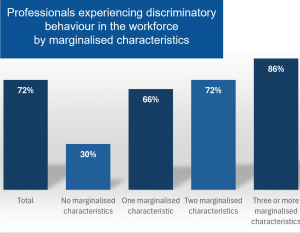07.03.24
Nearly three in four professionals say they experience ‘discriminatory or exclusionary’ workplace behaviour
New equality, diversity and inclusion (EDI) research from The Young Foundation conducted on behalf of CILEx Regulation and 11 other professional membership and regulatory chartered bodies collaborative* has been published today.
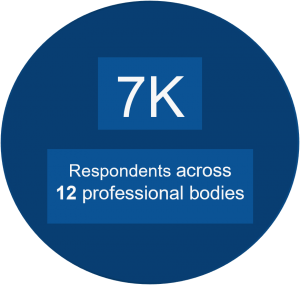 The report, Beyond Buzzwords, incorporates insights from more than 7,000 professionals across accountancy, engineering, health and safety, facilities management, human resources, insurance, law, management, procurement and public relations. It also looks at the experiences of CILEX members specifically.
The report, Beyond Buzzwords, incorporates insights from more than 7,000 professionals across accountancy, engineering, health and safety, facilities management, human resources, insurance, law, management, procurement and public relations. It also looks at the experiences of CILEX members specifically.
The research looks at how recent efforts to promote equality, diversity and inclusion (EDI) have been experienced across and between a range of professions and identifies that a new approach is needed. Interventions to address barriers and to enable fair career progression must focus on changing the systems that reinforce marginalisation.
Main findings
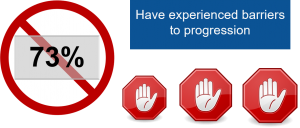 Nearly three-quarters of respondents (73%) had experienced barriers to career progression or experienced some form of ‘discriminatory or exclusionary’ behaviour in their workplace since the start of 2019 (72%).
Nearly three-quarters of respondents (73%) had experienced barriers to career progression or experienced some form of ‘discriminatory or exclusionary’ behaviour in their workplace since the start of 2019 (72%).
Negative experiences were even more pronounced among those with multiple marginalised characteristics. The report recommends that rather than focussing on isolated initiatives, a different approach that requires reframing of how EDI is understood is required:
- EDI must be guiding principles for all decision-making – not just for specific initiatives.
- Interventions must focus on changing the systems that underpin marginalisation.
“For many years, the professions have shown real commitment in taking action on EDI. Yet we need to drive greater change, with organisations pushing forward higher standards….Interventions must focus on changing the systems that underpin marginalisation.” Lead Young Foundation researcher, Alice Bell.
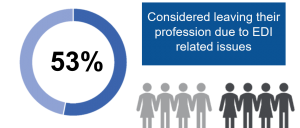
A number of concerns emerged from the research including:
- Widespread scepticism that ambitious EDI goals are being translated into meaningful actions.
- Access and entry routes into many professions remain challenging for people from minority backgrounds.
- Many professionals feel excluded from informal networks and opportunities to develop their careers.
- More than half (53%) have considered leaving their employer or profession due to EDI concerns, related to feeling undervalued or having limited scope to progress.
CRL specific research findings
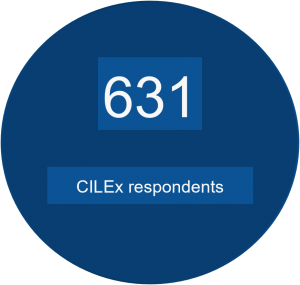
CRL participants compared to the majority of other bodies in the collaborative were significantly more likely to be:

Compared to the majority of other organisations, CRL’s participants disagreed:
- that their unique personal attributes, characteristics, and background are valued within the profession and
- that the profession is inclusive regardless of socioeconomic background or caring responsibilities.
They had encountered barriers on joining the profession including:
- worries about affordability of training
- concerns about the university attended or not gaining a university degree
- a lack of social/professional networks with people already in the profession
- Worries about “fitting in” due to being a minority in the profession – for example, on the basis of gender, ethnicity, or social class
Some had entered the profession using internships and received financial support through bursaries or scholarships.
Amongst the professions, more CRL participants had considered leaving the profession or their organisation mainly because of:
- unequal pay and/or benefits
- burnout or unmanageable workload
Other issues raised included mental wellbeing of law sector workers and feeling under pressure to work longer hours.
Participants did acknowledge some improvements in the diversity profile of new entrants, but still felt that the law sector was dominated by males of white ethnicity from middle/upper class backgrounds. Some identified concerns around a lack of transparency about pay and the impact of childcare responsibilities on career progression.
Access into law was discussed in relation to the CILEX route into law and how this has improved inclusivity in the sector. Employers are seen to be increasingly recognising the benefits of hiring individuals who have qualified via the CILEX route in terms of it offering a more diverse range of knowledge and professionals who have empathy with the communities they serve.
John Barwick interim CEO at CILEx Regulation commented:
“This research provides important insight into the real-life experiences of individuals entering and working in professions where their characteristics do not reflect the dominant demographic. By increasing and sharing our knowledge of current perceptions and lived experiences, we can feed into practical actions to address barriers in the legal sector.
An inclusive and effective legal sector where individuals can progress on merit regardless of their background requires commitment across the range of individuals and organisations that impact the sector. Educators, professional bodies, employers, regulators and individuals all have a part to play in supporting the necessary culture and systems change to deliver a strong and diverse workforce to meet diverse consumers’ legal needs.
We would like to thank the Young Foundation and members of the collaborative for this valuable cross-sector and law sector specific analysis and insight which will help inform our EDI strategic plan.”
Future impact
The Young Foundation have put forward an Action Plan (see below) and recommendations, based on the research findings with a focus on achieving `systemic change’ through `tailored solutions’ that could have significant impacts (e.g. normalising flexible working, creating accessible learning resources, targeted development programmes and removing biases in hiring).
Continued collaboration on EDI issues across the professions could be a key driver for meaningful change.
Find out more
- The Young Foundation are an independent research agency, “bringing communities, organisations and policymakers together, driving positive change to shape a fairer future.
- Young Foundation Press Release
- Young Foundation Full and Summary report
- CILEx Regulation Research report
- *Chartered Bodies Collaborative
1 Marginalised characteristics definition
- A marginalised gender identity (women, non-binary people, trans people, and/or people with other marginalised gender identities)
- A minoritised ethnic group, faith or identity (Black, Asian, mixed or other ethnicities and/or non-Christian religions)
- A marginalised sexual orientation (lesbian, gay, bisexual, queer or other non-heterosexual orientation) • A physical and/or mental health condition and/or neurodivergence
- A lower socioeconomic background (based on parental occupation age 14).
Action Plan
Young Foundation recommendations for the consortium:
Put EDI at the heart of what it means to be a professional by committing to:
- updating codes of ethics/ conduct, with corresponding reviews of professional standards, to embed EDI principles.
- reframing EDI as non-negotiable, and integral to all decision-making.
Set higher standards for professionals by committing to:
- embedding EDI across all learning and development opportunities.
- ensuring members are not granted with the highest levels of chartership or accreditation without core competencies around EDI.
Actively involve professionals in change by providing meaningful opportunities for members, learners and employers to shape action around EDI in their profession – including:
- creating working groups for professionals to be involved in reviewing key actions.
- ensuring accountability mechanisms through which professionals’ feed back about activities, and communications is acted upon.
Become role models for good practice by:
- ensuring all strategies, policies, procedures and practices are approached with an EDI lens.
- continuously monitoring progress.


